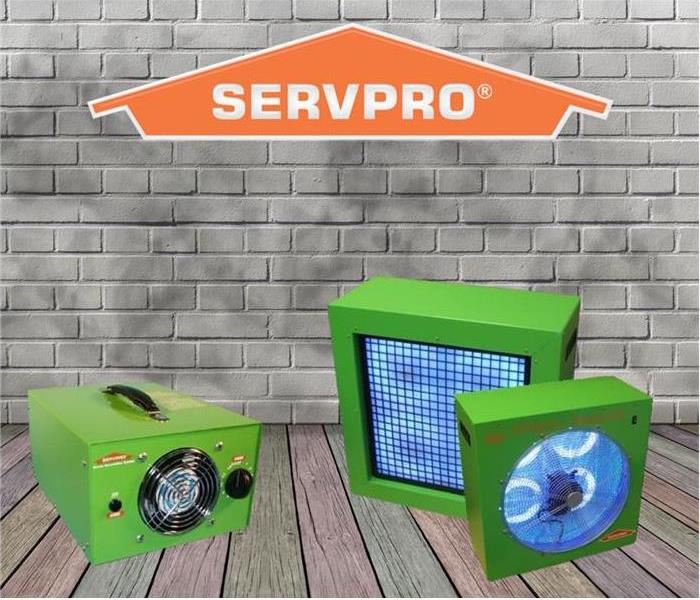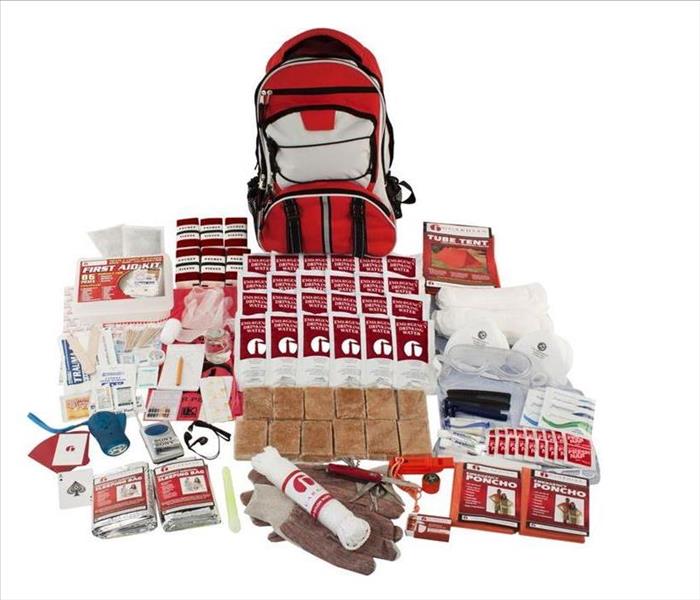What is an Ozone Generator?
11/22/2020 (Permalink)
 Ozone and Hydroxyl Generators
Ozone and Hydroxyl Generators
If you have ever had a fire on your property and had SERVPRO come out to restore, you will know what an ozone generator is. For those who have not, an ozone generator is a machine that charges the air around it creating O3 out of the O2 molecules we breathe.
What We Use Ozone For
The primary function that we use an ozone generator for is the eliminate odors, especially odors caused by fires. We can use this technique of odor removal in many different cases such as, clothing, furniture, and entire rooms no matter the size. While the odor removal works great, there is a downside to using ozone in excess.
Precautions to Ozone
As stated earlier, ozone is different from the air we breathe. This reaction makes O3 poisonous if it is ingested in excess. This is why we close off the area that is being deodorized during the process. You can trust that we take every precaution necessary to keep our customers and employees safe.
If you experience a fire loss, give SERVPRO of Collinsville/Troy, SERVPRO of Alton, Edwardsville & Granite City and SERVPRO of Belleville-O'Fallon a call at (618) 667-8648.
Holiday Safety Tips.
12/7/2018 (Permalink)
We all enjoy lights during the holiday season but beware of the possible danger.
Holiday lighting poses a real fire risk if not used safely. So before you finish the
holiday decorating, be sure to check out these holiday lights safety tips:
Christmas Trees
Many artificial trees are fire resistant. If you buy one, look for a statement specifying this protection
A fresh tree will stay green longer and be less of a fire hazard than a dry tree
Use only Christmas tree lights that are rated for indoor use and tested for safety. Check for the label of an independent testing laboratory like Underwriters’ Laboratory (UL).
If you have a metallic Christmas tree, never put electric lights on it to avoid the risk of electric shock.
Before using lights, check each set of lights for worn or broken cords, broken or cracked sockets, and loose bulb connections. Replace damaged lights.
Connect no more than three standard-size sets of lights into an extension cord. Don’t overload electrical outlets or extension cords, instead plug lights into different circuits around your home.
Don’t fasten colored spotlights onto metallic trees. Use them above or beside your tree to prevent tree branches from becoming charged with electricity from faulty lights.
Turn off the all Christmas lights and decorations when going to bed or leaving home.
Keep pets safe by protecting electric cords and tree lights so that they can’t chew them and get electrocuted.
Outdoor Lights
Make sure outdoor lights are rated for exterior use by an independent testing laboratory. Exterior lights and extension cords used outdoors need to be weather-resistant.
Fasten outdoor lights securely to trees, house, walls or other firm support to protect from wind damage. However, don't attach light strings with nails or staples as these can cut through the wire insulation and start a fire. Use only UL-approved hangers.
The tree can become charged with electricity from faulty lights, and any person touching a branch could be electrocuted! To avoid this danger, use colored spotlights above or beside a tree, never fastened onto it!
Take exterior lights down within 90 days to prevent hazards from weather damage or animals chewing on them.
Store lights safely after taking them down. Tangled lights can lead to damaged cords and broken sockets. They can be difficult to untangle! Wrap the strings around a piece of cardboard, cover them in paper or fabric, and then store in a sturdy container until next year.
Candles
Never use real candles to decorate a tree. Use battery-operated, flame-less LED candles instead.
If you do use real candles, follow these candle fire safety guidelines:
Use only non-flammable candle holders.
Place candles where they can’t be knocked down or blown over.
Keep candles away from any flammable objects like decorations or drapes.
Never burn candles near trees or greenery.
Never leave a burning candle unattended. .
Keep safe this Holiday season. SERVPRO of Collinsville/Troy is always here to help
Is your family prepared for a power outage?
7/16/2018 (Permalink)
 Emergency kit
Emergency kit
We have experienced a few storms in the last month. Those storms have caused many homes to lose power for minutes to days. Are you prepared if you lose power? Being prepared for a storm will keep you less stressed when the storm hits. Depending on how bad the storm is you may be on your own for a while. Meaning you will need to have your own food, water, flash lights and more. Decide on a designated spot for your emergency kit and also a designated area for everyone in your home to meet during a storm. Check your kit often to make sure batteries are still good, the food hasn’t expired or anything is missing.
The following is a list of items that are suggested to keep on hand:
- Flashlights for each family member
- Battery-operated radio and clock
- Extra batteries
- Containers of bottled water
- Canned, freeze-dried or dehydrated food, powdered milk, baby supplies for infants
- Non-electric can opener
- List of important phone numbers
- First-aid kit
Keep food on hand that does not require you to cook. Here is a general list of food ideas to stock up on:
- Store at least a three-day supply of non-perishable food.
- Choose foods your family will eat.
- Remember any special dietary needs.
- Avoid foods that will make you thirsty.
- Choose salt-free crackers, whole grain cereals and canned foods with high liquid content.
- Ready-to-eat canned meats, fruits, vegetables and a can opener
- Protein or fruit bars
- Dry cereal or granola
- Peanut butter
- Dried fruit
- Nuts
- Crackers
- Canned juices
- Non-perishable pasteurized milk
- High energy foods
- Food for infants
SERVPRO of Collinsville/Troy is always here to help if you experience any damage due to a storm! We specialize in fire, water and mold clean-up and remediation. Give our office a call at 618-667-8648
Stay safe in this extreme heat!
7/5/2018 (Permalink)
Lately the weather has been very dry, hot and humid. We have been on a heat advisory as well. Extreme heat is when the temperature is above 90 degrees for two to three days. During extreme heat evaporation is slowed and the body works harder to maintain normal body temperature.
Using these tips will help keep you cool and safe during this horrible heat.
- Wearing light and loose clothing will keep you cooler. Dark tight-fitting clothing will trap in the rays; keeping the heat in.
- Drink more water! Try to stay away from caffeine and alcohol as well.
- Avoid high-energy activities and get help when doing hard manual work outside
- Keep your home cooler by covering all windows with drapes or shades, using weather-strips on all windows and doors, and using an attic fan if you have one.
Check often on your elderly, neighbors and pets. This heat can cause dehydration, heat exhaustion, and heat strokes. Staying hydrated and cool will less your chance from any heat illness.
SERVPRO wants everyone to continue to have a fun, cool and safe summer!!





 24/7 Emergency Service
24/7 Emergency Service

